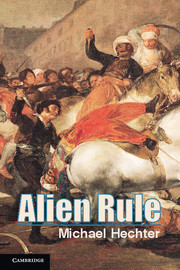Book contents
- Frontmatter
- Book part
- Contents
- List of Figures and Photographs
- Preface
- 1 Introduction
- 2 Alien Rule and Its Discontents
- 3 The Failure of Legitimate Rule in Iraq
- 4 Resistance to Alien Rule in Taiwan and Korea
- 5 Dynamics of Military Occupation
- 6 Academic Receivership as Alien Rule
- 7 Conclusion
- Bibliography
- Index
1 - Introduction
Published online by Cambridge University Press: 05 June 2014
- Frontmatter
- Book part
- Contents
- List of Figures and Photographs
- Preface
- 1 Introduction
- 2 Alien Rule and Its Discontents
- 3 The Failure of Legitimate Rule in Iraq
- 4 Resistance to Alien Rule in Taiwan and Korea
- 5 Dynamics of Military Occupation
- 6 Academic Receivership as Alien Rule
- 7 Conclusion
- Bibliography
- Index
Summary
The difference between inbred oppression and that which is from without is essential, inasmuch as the former does not exclude from the minds of the people a feeling of being self-governed; does not imply (as the latter does, when patiently submitted to) an abandonment of the first duty imposed by the faculty of reason.
– William WordsworthIn July 1808, a new constitution was presented to the Spanish people by King Joseph. For the first time in the country’s history, Spain was offered an independent judiciary, freedom of the press, and the abolition of aristocratic and ecclesiastical feudal privileges. At this time, 3,148 towns and villages were owned by clerical overlords who ruled over some of Europe’s most impoverished tenants. However, as Goya’s iconic paintings of the turmoil in Madrid in May of that year reveal, far from welcoming greater political liberty and freedom from feudal rule, Spain’s peasants instead followed their priests and rose up against the constitution and the king who proposed it. Why did they spurn the freedoms they had been offered? Why did they reject a regime that promised them greater opportunities and superior material conditions? They did so because Joseph, the brother of Napoleon Bonaparte, had been installed on the Spanish throne by French troops in the previous month (Luttwak 2005). In the end, the peasants preferred poor rule by Spaniards to the promise of better rule by Frenchmen.
- Type
- Chapter
- Information
- Alien Rule , pp. 1 - 26Publisher: Cambridge University PressPrint publication year: 2013
- 1
- Cited by



